What does a former Bond girl, top model, and ceramic artist do as she prepares to turn 60? If you’re Carey Lowell, you embrace it with pride and appreciation for all of your past accomplishments and with excitement and anticipation for what the future holds. It means confidently walking out of a SoulCycle makeup free, and covered in sweat.
“It’s been an interesting journey,” said Lowell, best known for her roles as Pam Bouvier in License to Kill and her five-year run as Jamie Ross on Law & Order. “I decided to step away from acting and embrace ceramics, which I learned in high school. It’s something I enjoy. It’s empowering to do things that feed my soul. I have this chance to be creative and to express myself.”
Lowell was one of the impressive speakers at Wednesday’s Out Loud event, a night to celebrate and embrace our age and appreciate the sense of confidence and freedom that comes with growing older. NextTribe’s Out Loud is all about aging boldly, not anti aging.
“This is not a generation of women who are laissez faire, just letting life happen,” said Linda Wells, 61, founding editor of Allure and one of the night’s speakers. “In all areas of our life, we take charge. We’re not passive people. Women are going to want to work longer, and do different things, inventing new chapters of themselves. We’re not about to tiptoe off into the sunset.”
Out Loud was created by NextTribe to celebrate the power and creativity of women over 45. This is the second New York Out Loud event, with others held this year in Austin and Los Angeles. Each event has featured a powerhouse roster of inspiring speakers and provided a chance to connect with other women.
What Aging Boldly Means
Aging boldly meant different things to the more than 200 women gathered at the spacious Westside Loft in New York. When NextTribe founder Jeannie Ralston asked from the stage what Aging Boldly meant to others in the audience, women shouted out responses—everthing from letting go of self-judgment to having sex for the first time in 16 years (which prompted wild cheers).
“I think that the mere fact that you’re in this room is a pretty clear indication that you’re aging boldly,” said Jeannie, decked out in black-and-white sequin pants and a red tank. “It means that you’re not accepting society’s idea of how women at our age should act. You’re not accepting the idea that the future is a long slide down. You’re not accepting the idea that we’re somehow done and should move off the stage. We’re claiming the stage right here.”
The speakers talked about how events in their lives, often tragic and unexpected, ultimately provided an opportunity for reinvention—experiences such as the loss of a high-profile job, the birth of an autistic child, and a cancer diagnosis.
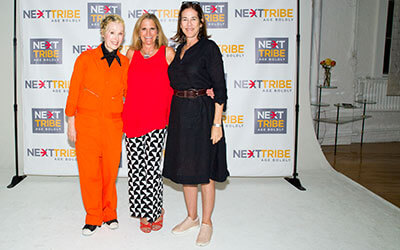
Speakers E. Jean Carroll and Lisa Birnbach with NextTribe editor Jeannie Ralston.
Time to Fight
The first speaker was E. Jean Carroll, a writer for Saturday Night Live and the first female contributing editor for Playboy. She recently published What Do We Need Men For?, inspired by her popular 26 years of writing her “Ask E. Jean” advice column in Elle Magazine. Most of those asking questions had one thing in common: they had problems with men.
“I thought, ‘We should get rid of them,’” Carroll said.
Instead, she got into her polka-dotted Prius with her blue-haired dog and traveled to American towns with female names like Eden, Vermont, and Tallulah, Louisiana, to ask women the crucial question: What Do We Need Men For?
Carroll was thrust into the spotlight this summer when she opened up about an alleged assault 20 years ago by President Donald Trump in the dressing room at Bergdorf Goodman. She was interviewed on stage Wednesday night by her longtime friend Lisa Birnbach, author of The Official Preppy Handbook, who was the first person Carroll called after the infamous dressing-room encounter.
Carroll, twice married and twice divorced herself, is a case study in resilience and strength.
“I think the time is over when women are damsels,” Carroll said. “I think the time is over when men do things to women. We fight. I got out of that dressing room!”
Opening to the Universe
At 71 years old, Fern Mallis—“The Godmother of Fashion”—exemplifies the power of reinvention. The former senior vice president of IMG Fashion and the executive director of the Council of Fashion Designers of America, she is the author of Fashion Lives: Fashion Icons with Fern Mallis.
Mallis may be best known for creating New York Fashion Week, but in 2010, at the age of 62, she decided to walk away from that position. The decision, she said, was prompted by Fashion Week’s move from Bryant Park to Lincoln Center, and the once intimate event became a bureaucracy that was focused on the bottom line rather than the hemline.
“The truth was, it had become all about making money and making the sponsors happy and less about the designers, which is why I started Fashion Week,” Mallis said. “It was a perfect time to say, ‘I’m leaving.’ You have to know when it’s time, and I felt it in every bone of my body. I just wasn’t happy anymore.”
She took a year off, but with a mortgage, a car, and nobody else to take care of her—not to mention a drive to do something new and creative—she wasn’t about to retire. But she had no idea what she would do next.
“I said ‘I’m going to let the universe deliver,’” she recalls. “Sometimes you just need to do that.”
And deliver it did. After countless coffee meetings—“nobody was offering lunch or dinner and I had coffee coming out of my ears”—she was offered an opportunity beyond her wildest dreams.
New York City’s 92nd Street Y (known as 92Y) offered her the chance to launch “Fashion Icons,” an interview series with some of the world’s top fashion icons—legends like Bill Cunningham, Calvin Klein, Donna Karan, Tom Ford, and Diane von Furstenberg.
“I have really restarted my career,” Mallis said.
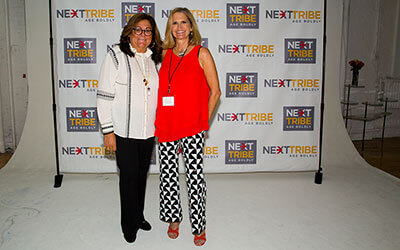
Speaker Fern Mallis with Jeannie Ralston. Image: Mark Goldberg
Telling the Important Stories
For writer Judith Newman, getting older has meant becoming less afraid, and being kinder. Newman has written for such publications as the New York Times, Vanity Fair, Harper’s, the Wall Street Journal, Allure, and Vogue. But she recently published one of her most important, personal, and most widely read projects—To Siri, With Love: A Mother, Her Autistic Son, and the Kindness of Machines.
In the book, Newman shares the story of how Apple’s electronic personal assistant, Siri, helped her son, Gus, who has autism and has trouble looking people in the eye, hops when he’s happy and connects with inanimate objects on an empathetic level.
“I never thought (the book) would be translated into a million different languages and that I would hear from Apple engineers wanting to know how it worked,” said Newman, who was interviewed by author Judith Kelman, an acclaimed author in her own right who runs Visible Ink, a healing through storytelling program at Memorial Sloan Kettering. “I say to all of you, what do you have to lose by sitting down and writing a story to the best of your ability? Everyone here has a story that, given the right circumstances and right frame of mind may read and touch a lot of people.”
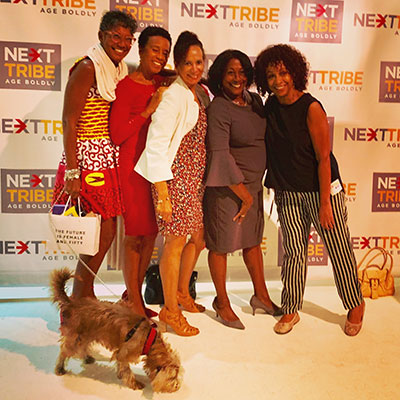
Speaker Ricki Fairley with friends and her dog Harper.
Peace is Non-Negotiable
A woman with just such a story—and the ability to take adversity and turn it into her next chapter—is Ricki Fairley. Fairley is a seasoned marketer with over 30 years of marketing experience, including 20 years in brand management at Johnson & Johnson, Nabisco, Reckitt & Colman, and The Coca-Cola Company.
“I was your typical super mom, super mother, super businessman, taking care of everybody,” Fairley said. “I felt like an octopus, doing everything for everybody.”
And then, life threw the biggest of curve balls: triple negative breast cancer, one of the worst types.
“I was thrust into the whirlwind of having breast cancer,” said Fairley. “My doctor told me my life will change dramatically, and she said I need to remove stress from your life. I asked, how do I know when I’m stressed out. She said, `How many times do you think or say the word asshole throughout the day.’” This made her stop and re-evaluate her life. “Not only did I have to get rid of the cancer in my body, but I had to get rid of all the cancers in my life.”
That meant selling her big house, divorcing her husband (whom she now calls her “wasband”), and separating from her business partners.
“I had to choose life in every decision I made,” Fairley said. “I had to figure out how to find my peace, and I realized my peace is non-negotiable.”
Originally given two years to live, she is now an eight-year survivor. Fairley, 62, has made it her personal purpose, passion, and mission to raise awareness and fundraise for a cure for breast cancer. She serves as chair of the board of trustees for the Triple Negative Breast Cancer Foundation. In June 2019, she founded the Sisters Network, which works to increase awareness of breast cancer and reduce the mortality rate in the African American community.
“You shouldn’t have to go through what I went through to live your truth, to live your passion,” Fairley said. “But I realized God left me here to talk about breasts, to look after other people’s breasts.”
Pushing On
Linda Wells, the founding editor of Allure magazine, unexpectedly found herself looking for a new passion when she was laid off from the magazine. It was an event, in retrospect, that gave her the push she needed to pursue new opportunities.
“I didn’t want that to happen,” she said. “But I felt like it was time for me to go, and I wouldn’t have done that on my own. Once I got through it mentally, I really felt like I was lucky I had the chance to do what I did for 25 years, and now I had the chance to reinvent myself.”
That meant returning to her writer and editor roots, which brought back her love of talking to people one on one. And then she was handed “an incredible” gift to go to Revlon in 2018 to create Flesh, a makeup collection designed to meet the needs of a wide range of skin tones. She left Revlon in April (she still works for Flesh as a consultant), and is working on a next top-secret venture.
“I was allowed to learn about a whole new world, which I knew about as an editor and a consumer,” Wells said. “Sometimes we need that little push, and I was lucky I got that chance.”
Wells and her friend Carey Lowell, who sat on the panel together, talked about their mutual disgust with the way the beauty industry addresses women as they age. Not only are women over 30 not well represented, there is a general discomfort about the demographic.
Too often, women over 40 have felt invisible to brands, taken for granted despite their powerful purchasing power. When brands do address our demographic, they tend to look at aging negatively—something to fight.
“There is an issue of shame attached to it,” Wells said. “The worst thing is to feel shame about the way you look.”
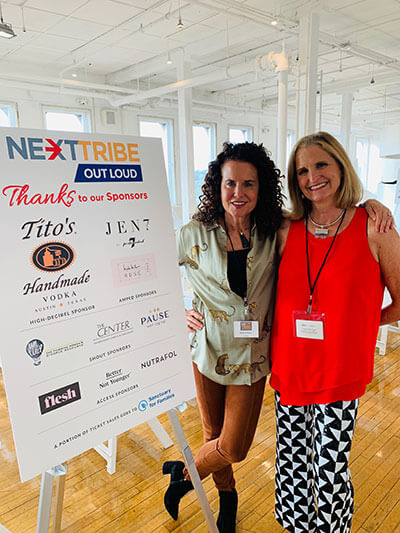
Editor Jeannie Ralston with Michelle Breyer, NextTribe board member.
Brands That “Get” Us
Out Loud was a chance to highlight companies that have put us front and center. Out Loud sponsors included:
- Jen7 Jeans, a premium women’s denim collection by the experts at 7 For All Mankind designed for older, more sophisticated customers who are focused on fit rather than seasonal, trend-driven styles.
- Pause Well Aging, the skincare line developed by Rochelle Weitzner especially for menopausal women.
- Nutrofol, a supplement brand created by three people experiencing thinning hair.
- UNtied, “The thinking woman’s Divorce Resource,” developed by founder Elise Pettus to provide support, wisdom, and resources on almost any topic related to divorce.
- Dr. David Bank from The Center for Dermatology, Cosmetic and Laser Surgery in Mt. Kisco, NY, NextTribe beauty director Cheryl Kramer Kaye’s favorite dermatologist.
- Flesh, the Revlon makeup collection created by speaker Linda Wells that was created for a wide range of skin tones.
- Drink sponsors included Nicole Miller Rosé, a wine created by the iconic fashion designer, and Tito’s Handmade Vodka, an Austin-based company like NextTribe.
- Better Not Younger, a hair care line created by Sonsoles Gonzalez, a veteran of L’Oreal and P&G, to treat both the root causes and visible signs of aging. The result is a renewed follicle structure and texture for healthy, lustrous, vibrant hair — and the confidence that comes with it.
If Out Loud had any overriding theme, it’s that we as women have enormous power to change society’s narrative about what it means to grow older.
“The only way to anti age is to die,” Wells said. “That’s not really the solution we want to have. The language fails us. Fuck aging gracefully. My feeling is that the future has to hold a lot of ways of aging, and we should be able to figure out our own version.”

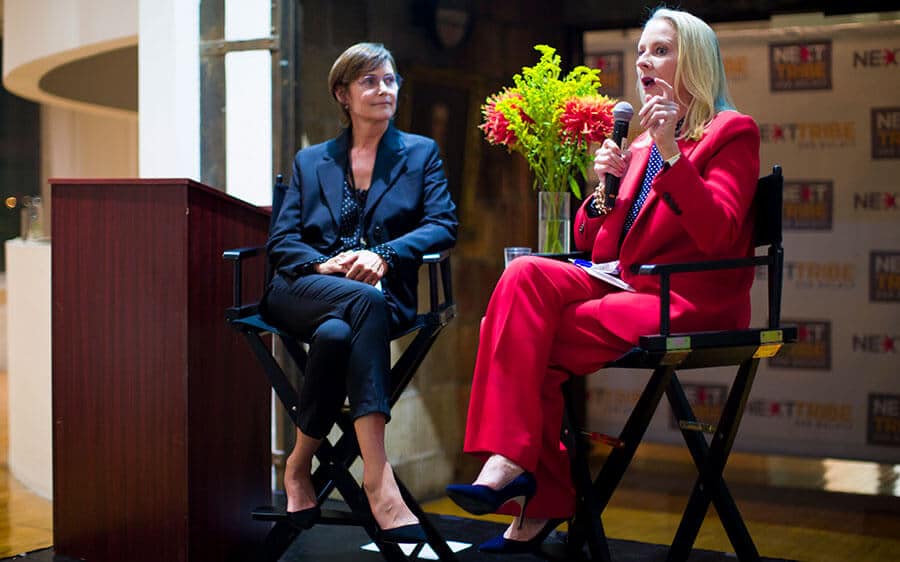





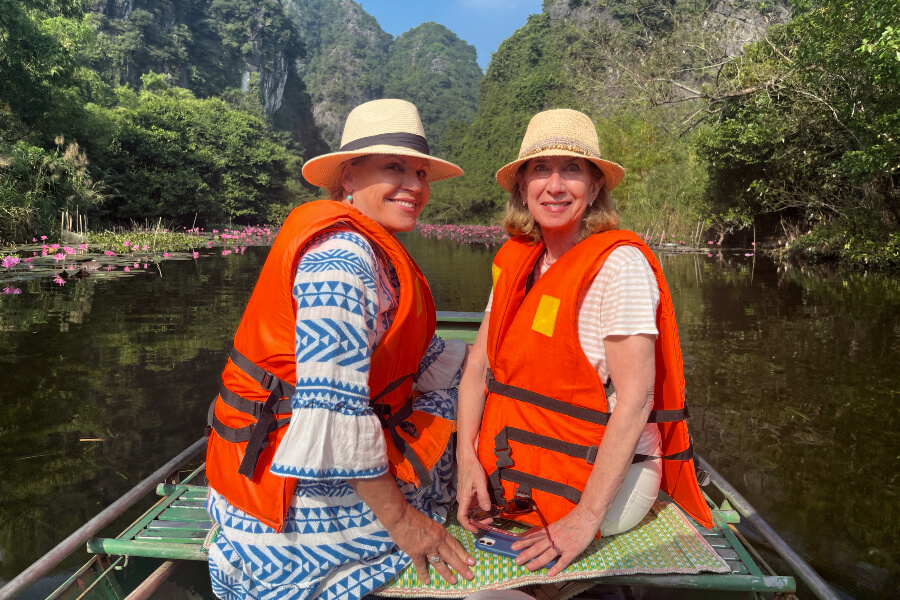
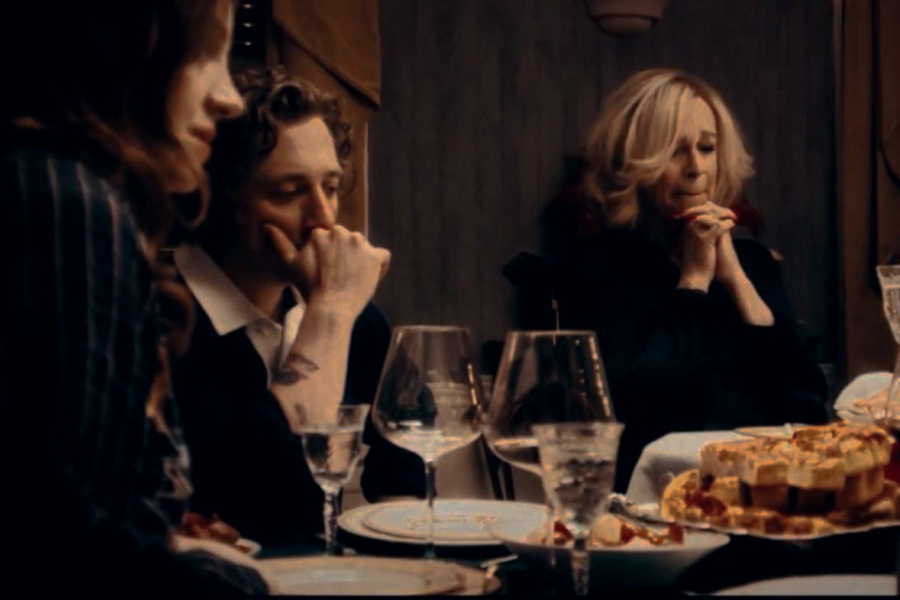


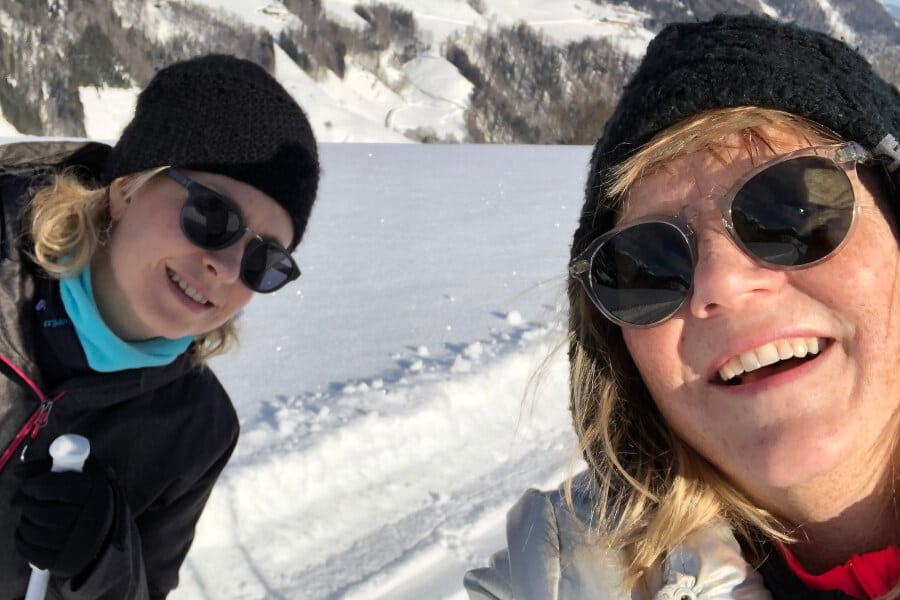
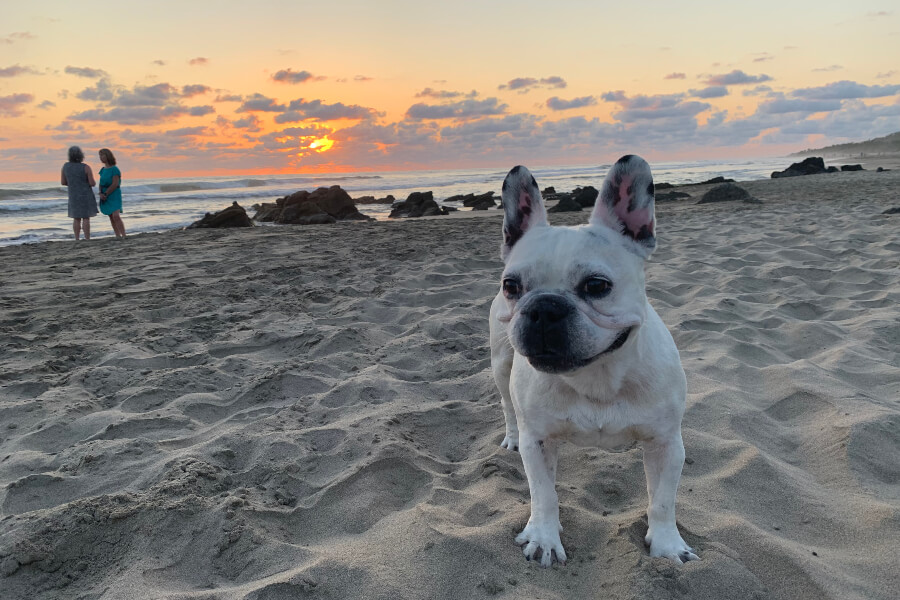

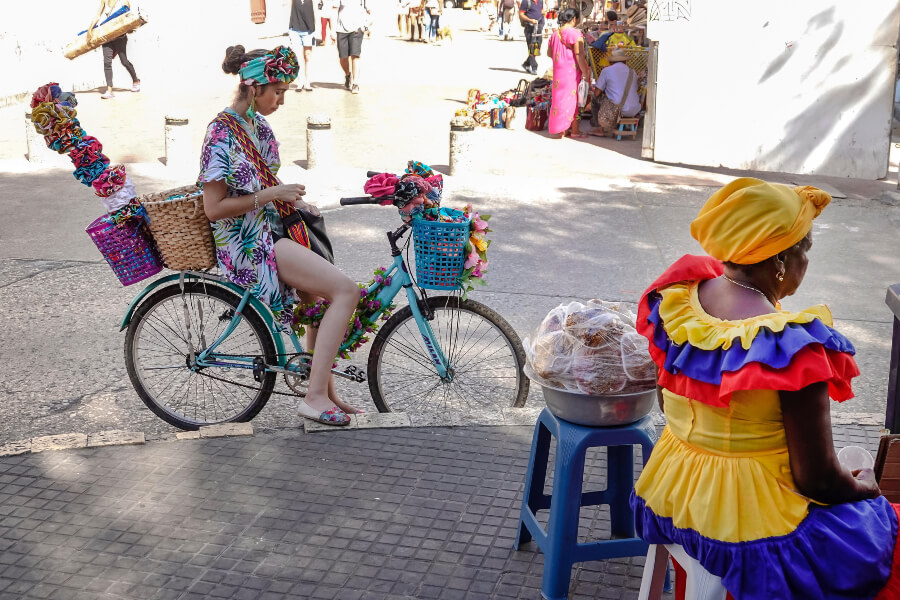

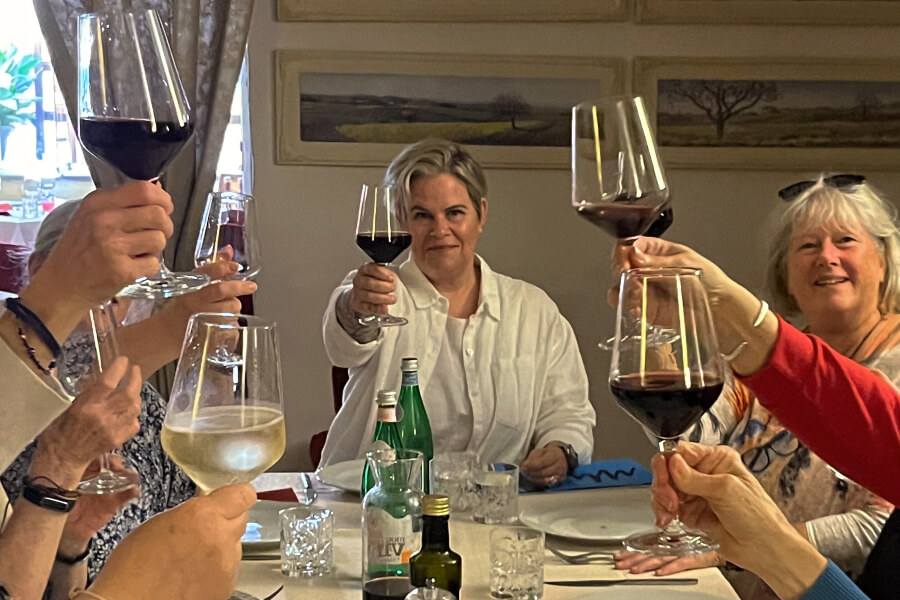




0 Comments